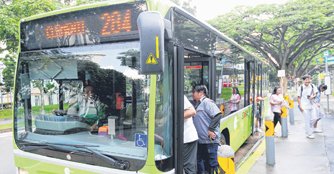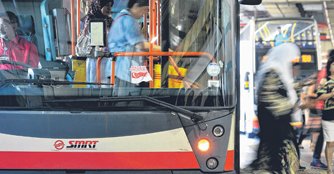Commuters happier with buses than trains: Poll
27 Sep 2018|948 views
For the first time in over a decade, commuters here are more satisfied with buses than trains, according to a recent survey on customer satisfaction with modes of transport.
The response suggests that the "significant investments" made by the authorities in the bus system in recent years have paid off, said the Singapore Management University's Institute of Service Excellence (ISE), which conducted the survey.
Public buses scored 65.6 points, on a scale of zero to 100, in the land and air transport Customer Satisfaction Index of Singapore, released yesterday. In comparison, the MRT scored 63.6 points in the index.
Between April and July, more than 6,200 people were surveyed for the quarterly index on issues such as comfort and safety of various transport modes and companies. This is the first time buses have outperformed the MRT since the index began in 2007.
ISE Executive Director Neeta Lachmandas pointed to measures such as the Bus Service Enhancement Programme as the reason commuters have become happier with buses. The $1.1 billion programme - which introduced 1,000 new buses and 80 new bus services between 2012 and last year - helped cut waiting time and reduced crowds on buses during peak periods. Such investments have gained the bus sector more satisfaction points for four consecutive years, noted Ms. Lachmandas.
For public buses, SMRT Buses scored the highest, with 67.3 points, followed by SBS Transit with 65.2 points. The other operators were ranked together, with a score of 63.4 points. A Public Transport Council survey of more than 5,000 commuters last year also noted greater satisfaction with buses than trains.
Meanwhile, satisfaction with transport booking apps - which include mobile apps for ride-hailing operator Grab as well as taxi giant ComfortDelGro - dipped from 69.3 points to 68 points. The ComfortDelGro app scored higher at 68.8 points, compared with 67.5 points for Grab.
The most significant decreases came in satisfaction with promotions and discounts, which dropped 17.1%, and satisfaction with fares, which fell by 7.7%. In May, Singapore-based Grab confirmed it was rolling back incentives for both riders and drivers, after users began reporting fewer promotional discounts. However, satisfaction with taxis has increased, from 71.8 points last year to 72.5 points this year.
In air transport, full-service airlines scored 74.5 points, while budget airlines scored 73.1 points. ISE noted this was the third consecutive annual increase in customer satisfaction for budget airlines, and that the difference in customer satisfaction between the two continues to narrow. This could mean more travellers see budget airlines as a "high-quality mode of air travel", rather than as a cheaper alternative, said Ms. Lachmandas.
Singapore Polytechnic's School of Business Lecturer Lucas Tok said that while prices for full-service airlines have gone down as they attempt to compete with budget services, budget airlines have stepped up their customer service. "The standards are really shifting," he said.
For the first time in over a decade, commuters here are more satisfied with buses than trains, according to a recent survey on customer satisfaction with modes of transport.
The response suggests that the "significant investments" made by the authorities in the bus system in recent years have paid off, said the Singapore Management University's Institute of Service Excellence (ISE), which conducted the survey.
Public buses scored 65.6 points, on a scale of zero to 100, in the land and air transport Customer Satisfaction Index of Singapore, released yesterday. In comparison, the MRT scored 63.6 points in the index.
Between April and July, more than 6,200 people were surveyed for the quarterly index on issues such as comfort and safety of various transport modes and companies. This is the first time buses have outperformed the MRT since the index began in 2007.
ISE Executive Director Neeta Lachmandas pointed to measures such as the Bus Service Enhancement Programme as the reason commuters have become happier with buses. The $1.1 billion programme - which introduced 1,000 new buses and 80 new bus services between 2012 and last year - helped cut waiting time and reduced crowds on buses during peak periods. Such investments have gained the bus sector more satisfaction points for four consecutive years, noted Ms. Lachmandas.
For public buses, SMRT Buses scored the highest, with 67.3 points, followed by SBS Transit with 65.2 points. The other operators were ranked together, with a score of 63.4 points. A Public Transport Council survey of more than 5,000 commuters last year also noted greater satisfaction with buses than trains.
Meanwhile, satisfaction with transport booking apps - which include mobile apps for ride-hailing operator Grab as well as taxi giant ComfortDelGro - dipped from 69.3 points to 68 points. The ComfortDelGro app scored higher at 68.8 points, compared with 67.5 points for Grab.
The most significant decreases came in satisfaction with promotions and discounts, which dropped 17.1%, and satisfaction with fares, which fell by 7.7%. In May, Singapore-based Grab confirmed it was rolling back incentives for both riders and drivers, after users began reporting fewer promotional discounts. However, satisfaction with taxis has increased, from 71.8 points last year to 72.5 points this year.
In air transport, full-service airlines scored 74.5 points, while budget airlines scored 73.1 points. ISE noted this was the third consecutive annual increase in customer satisfaction for budget airlines, and that the difference in customer satisfaction between the two continues to narrow. This could mean more travellers see budget airlines as a "high-quality mode of air travel", rather than as a cheaper alternative, said Ms. Lachmandas.
Singapore Polytechnic's School of Business Lecturer Lucas Tok said that while prices for full-service airlines have gone down as they attempt to compete with budget services, budget airlines have stepped up their customer service. "The standards are really shifting," he said.
Latest COE Prices
February 2026 | 2nd BIDDING
NEXT TENDER: 04 Mar 2026
CAT A$106,501
CAT B$105,001
CAT C$74,999
CAT E$112,890
View Full Results Thank You For Your Subscription.





















